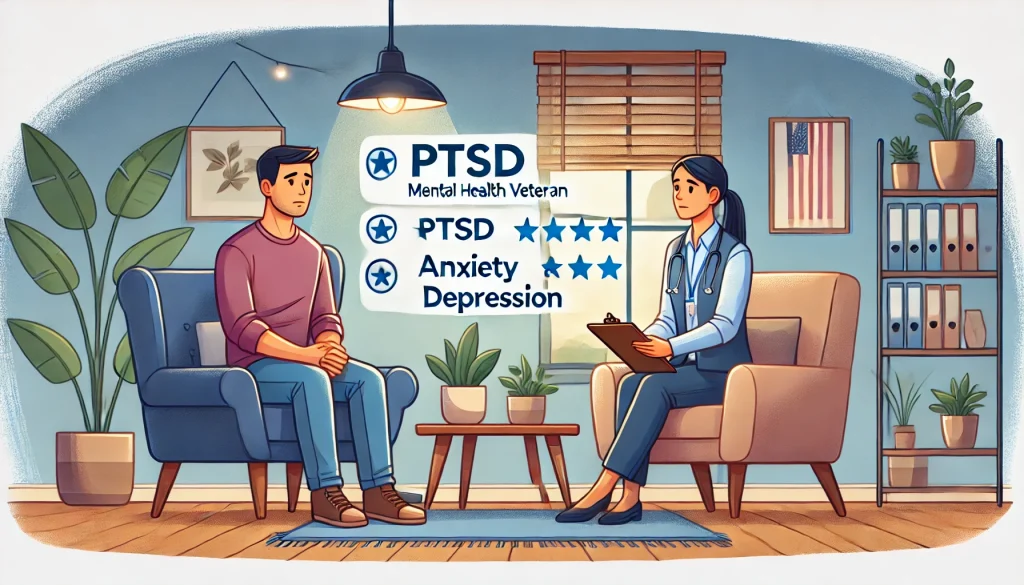Veterans suffering from PTSD, anxiety, and depression often wonder how the VA assigns disability ratings for these overlapping conditions.
The VA considers the impact of these mental health issues on a veteran’s social, occupational, and personal functioning when determining ratings.
While these conditions are related, veterans may receive separate or combined ratings depending on their symptoms and how they impact daily life.
VA Rating for PTSD, Anxiety, and Depression
The VA assigns ratings for mental health conditions under the General Rating Formula for Mental Disorders. While PTSD, anxiety, and depression are distinct diagnoses, the VA often evaluates them together, especially if they cause similar impairments. However, if each condition causes distinct symptoms and levels of impairment, a veteran may be eligible for separate ratings.
The combined rating system evaluates how much a veteran’s mental health conditions impair their ability to function in daily life.
Need Some More Help with your VA Disability?
Learn more about the VA Disability process and get help with our VA Disability Chatbot programmed and trained by AI

VA Compensation for PTSD, Depression, and Anxiety
Veterans can receive VA compensation for PTSD, depression, and anxiety if these conditions are service-connected. The VA uses a single rating schedule to assess all mental health conditions, including PTSD, anxiety, and depression. Compensation is based on the veteran’s symptoms and their overall effect on occupational and social functioning.
For more information, visit the VA’s official guide on mental health ratings.
VA Disability Rating for PTSD and Depression
While veterans may have separate diagnoses for PTSD and depression, the VA often assigns a combined rating unless each condition causes a distinct level of impairment. For example, if PTSD causes anxiety and insomnia, but depression leads to additional symptoms like fatigue and loss of motivation, the veteran may be entitled to separate ratings.
However, it’s common for the VA to rate both conditions together, using the symptoms that overlap as the basis for the rating.
Mental Health Ratings
Here is a breakdown of the VA mental health ratings, which apply to conditions like PTSD, anxiety, and depression:
- 0% Rating:
- The veteran is diagnosed with a mental health condition, but it doesn’t significantly impair their social or occupational functioning.
- Veterans with a 0% rating are eligible for healthcare benefits but do not receive compensation.
- 10% Rating:
- The veteran has mild or transient symptoms that cause social or occupational impairment only during times of significant stress.
- Veterans may experience mild anxiety, mild depression, or occasional sleep disturbances but generally function well.
- 30% Rating:
- The veteran experiences more frequent symptoms, such as anxiety, depression, or mild memory loss, causing occasional impairment.
- Social and work relationships are impacted, but the veteran remains mostly functional.
- 50% Rating:
- The veteran’s symptoms cause more severe impairment, with issues like frequent panic attacks, difficulty maintaining relationships, memory impairment, and reduced work efficiency.
- Veterans with this rating experience regular challenges in occupational and social settings.
- 70% Rating:
- Symptoms like near-continuous panic, depression, impaired impulse control, and difficulty maintaining personal relationships cause significant impairment in most areas of life.
- Veterans may struggle to maintain employment and social relationships, and they may neglect personal hygiene and daily activities.
- 100% Rating:
- The veteran experiences total social and occupational impairment.
- Symptoms may include delusions, hallucinations, grossly inappropriate behavior, an inability to perform daily living activities, and a danger to themselves or others.

PTSD with Major Depressive Disorder VA Rating
In many cases, veterans with both PTSD and major depressive disorder receive a combined rating based on the total effect of both conditions. Veterans who experience severe symptoms from both PTSD and depression may qualify for higher ratings, such as 70% or 100%.
However, the VA may assign separate ratings if the conditions cause unique impairments that do not overlap.
VA Disability for PTSD and Depression
To receive VA disability for PTSD and depression, veterans must provide:
- A formal diagnosis for each condition.
- Medical evidence that links the conditions to their military service.
- Documentation of symptoms and their impact on daily functioning.
Veterans can work with a VA-accredited representative or an attorney to file a successful claim for PTSD, anxiety, and depression.
For more details, visit VA Mental Health Resources.
Is PTSD and Depression the Same VA Disability?
Although PTSD and depression are different diagnoses, the VA often evaluates them together if they cause overlapping symptoms. If each condition results in different symptoms and levels of impairment, the VA may assign separate ratings. However, veterans should be aware that the VA frequently assigns a combined rating for related mental health conditions.
For a detailed explanation of how the VA rates PTSD and depression, visit How Often Does the VA Reduce Compensation?.
The VA assigns ratings for PTSD, anxiety, and depression based on the severity of the symptoms and how much they impact a veteran’s social and occupational functioning. In many cases, the VA will assign a combined rating for PTSD and depression, but separate ratings are possible if each condition causes distinct impairments.
Veterans struggling with PTSD, anxiety, or depression should gather medical evidence and work with a representative to ensure they receive the correct compensation for their conditions. For more information on filing for VA disability for PTSD and depression, visit the VA mental health page.
